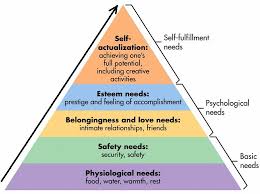Focusing on needs
After reading yesterday's post a friend asked me if I thought that Ash was now able to think about something other than his own survival because the strategies I'd put in place had given him space in his head to focus on something other than just that and I really do believe it. If he was overwhelmed with the thought of choosing what to wear in a morning why would he get out of bed? If he couldn't cope with questions why would he risk starting a conversation? If the thought of having to work out what jobs needed doing (never mind worrying because he no longer knew how to do them) stressed him out why would he move from the breakfast table? All of those fears must have been a block weighing down on him and preventing him from enjoying the life he used to love. Just buying five sets of the same outfit helped but he still had to work out where the clean ones were which panicked him. Replacing dirty clothes with clean ones dropped in almost exactly the same place has removed a huge obstacle from the start of each day. Not having the pressure of finding answers to questions which will interrupt his train of thought means he can now start conversations without fear. Not complaining if he doesn't do his share of jobs around the house means he can see what needs doing and do the things he's able to do.
Those of us who work with children or teach students of any age learn about Maslow's Hierarchy of Need. For those children and students to achieve they must first have their physical needs met, then they must feel safe and on up the hierarchy they go. The thing is that each level must be met before they can move on. If they are hungry, thirsty, cold etc they won't get to the part where they start to feel safe, if they don't feel safe they won't be able to form relationships and on and on. I've said before that by the time a person is diagnosed with dementia their self-esteem is at an all time low and my guess is that they are so focused on their physical needs and are feeling so frightened by what's happening to them that they are unable to function at any other level. There are of course physical difficulties which come with dementia but if you are with someone at the very beginning of this journey then I think bearing in mind the hierarchy of need will help. Meet the physical needs of your loved one then move on to making them feel safe and the rest will start to come naturally. Over the past few months I've worked really hard at both of these and we have moved on in leaps and bounds to the point where those who know us well comment on how much more engaged Ash is with the world around him. I do know this isn't always easy (only this morning I had to clamp my lips shut and walk out of the room before getting into a discussion without end) but I promise you it will be worth it. If you really want your loved one back then surely it's worth a go.
https://www.facebook.com/groups/1990374111022679/
memoryfortwo@gmail.com
Those of us who work with children or teach students of any age learn about Maslow's Hierarchy of Need. For those children and students to achieve they must first have their physical needs met, then they must feel safe and on up the hierarchy they go. The thing is that each level must be met before they can move on. If they are hungry, thirsty, cold etc they won't get to the part where they start to feel safe, if they don't feel safe they won't be able to form relationships and on and on. I've said before that by the time a person is diagnosed with dementia their self-esteem is at an all time low and my guess is that they are so focused on their physical needs and are feeling so frightened by what's happening to them that they are unable to function at any other level. There are of course physical difficulties which come with dementia but if you are with someone at the very beginning of this journey then I think bearing in mind the hierarchy of need will help. Meet the physical needs of your loved one then move on to making them feel safe and the rest will start to come naturally. Over the past few months I've worked really hard at both of these and we have moved on in leaps and bounds to the point where those who know us well comment on how much more engaged Ash is with the world around him. I do know this isn't always easy (only this morning I had to clamp my lips shut and walk out of the room before getting into a discussion without end) but I promise you it will be worth it. If you really want your loved one back then surely it's worth a go.
https://www.facebook.com/groups/1990374111022679/
memoryfortwo@gmail.com

Comments